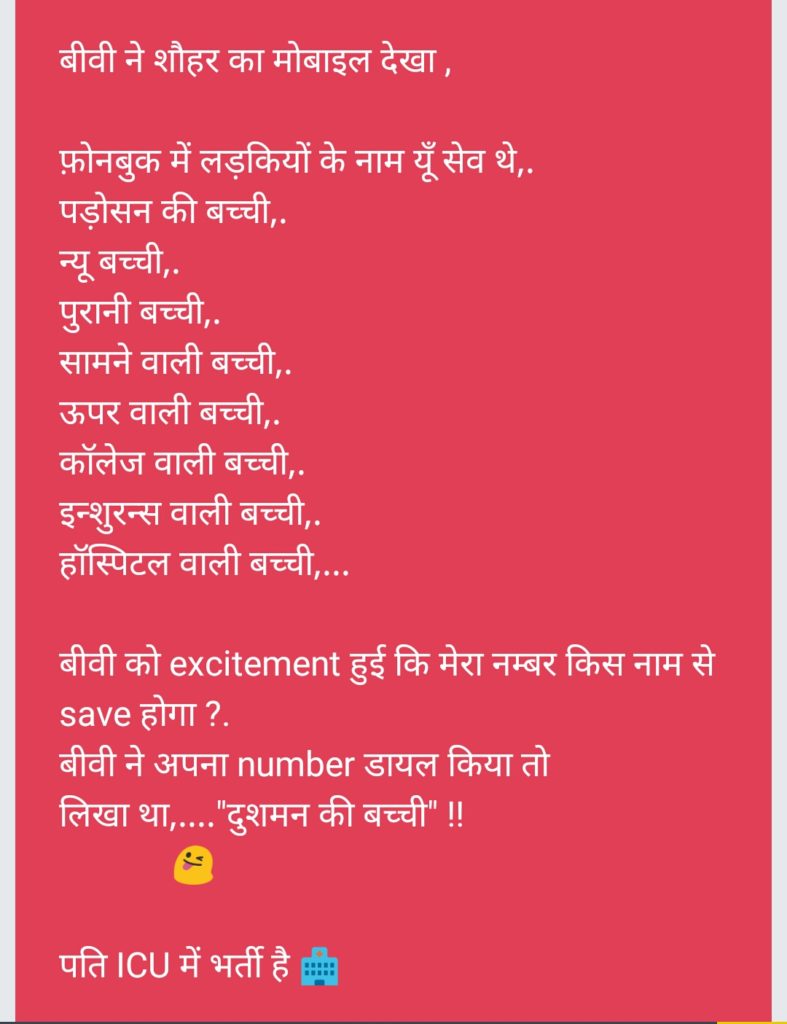Family Whatsapp groups are the bane of social media. I hate waking up to those inspirational quotes or to ‘Good Morning’ pictures of an unknown baby, or superstitious forwards, or devotional videos, circulated ad nauseam on such groups. They are regressive and discomfiting.
You know what else is regressive and makes me nauseous? Marriage jokes! Jokes about marriage; an institution I don’t exactly swear by anyway.
Let me first show some samples:



Cringe level: One thousand one!
Yes I know, I should ‘have a sense of humor’. Isn’t that what apologists are thinking right now?
Well, to try to rationalize my dislike, I probably would not be so annoyed if these jokes were at least funny. But the thing about marriage jokes is that, not only are they totally not-funny, they are also sexist and highly offensive. Primarily because they usually deploy a certain kind of gender imagery, prevalent in popular notions about heterosexual marriage. They base their ‘humor’ on the depiction of the two partners in a stereotypical, polarizing manner.
In some jokes, she is greedy and loves nothing other than shopping, using the husband’s money of course, and the husband is more than happy to be lavish as long as she stays away from him
Often the wife is the tyrant around the house, and the husband is the innocent victim. She is the frivolous chatterbox who will not stop talking, and the husband is the peaceful man of few words, who would rather contemplate; in others, she is greedy and loves nothing other than shopping, using the husband’s money of course, and the husband is more than happy to be lavish, as long as she stays away from him; in yet another depiction, she represents the constant threat of abuse to a husband who seems to have been forced into the marriage. A lot of times these jokes even take the form of philosophical musings about why marriage is suicidal for men, and is something a man is better off without.
In all of this, it is the figure of the hapless husband that is usually shown to be ‘oppressed’ — more often than not, due to the wife’s character flaws. Interestingly, the two figures sound not like people but ‘types’ — like stock characters in a play written following patriarchal conventions. Hence the generalization these jokes rely on assumes that all husbands and wives are the same. Not only is this generalization ignorant of people’s individualities, it is also unfair to those men and women who are actually in a genial, loving, egalitarian relationship.
This popular cultural trope of the ‘oppressed’ husband is quite in sync with the larger trend of male self-victimization, as Indian women (mostly middle class) come to terms with and embrace movements for gender equality. In cinema and in popular fiction in India, one notices male characters who are at the mercy of the ‘modern woman’ (think the cringe-inducing Pyaar ka Punchnama or Chetan Bhagat’s over-entitled male characters). Have we not seen worried advertisements where the modern independent woman has a career but is horrible at tasks in the kitchen?
This popular cultural trope of the ‘oppressed’ husband is quite in sync with the larger trend of male self-victimization
The interesting thing to emphasize here is that no matter what the form or cause of the male partner’s ‘oppression’, the ‘oppressor’ is always the female — whether as the nagging wife, who was supposedly a mistake or was forced onto the husband, or as the girlfriend who refuses to marry because she is too promiscuous or overtly ambitious. The joke then is truly on all women, since this demonization of the woman as the insensitive sex laughs ironically in the face of the oppressive realities that women in India live with.
The joke then is truly on all women, since this demonization of the woman as the insensitive sex laughs ironically in the face of the oppressive realities that women in India live with.
Importantly, a joke is never ‘just a joke’: humour is a social act that reveals social attitudes. Jokes emerge from within accepted norms of social behaviour and laughter is ensured by inverting the listener’s expectations about such behaviour. Jokes that centre on the figure of the cruel wife try to pass off deep-rooted misogyny as ‘male oppression’, while actually laughing at the demonized figure of an imagined oppressor, and do nothing other than strengthen existing patriarchal structures. In asking to be seen as ‘just laughter’, such jokes set the boundaries on how much sexism is ‘good humour’, making some kinds of misogyny not only acceptable but also desirable.
I have been told several times by ‘well-meaning’ male friends to learn to laugh at myself (As a woman? As a feminist? As both?) Well, sure. I would gladly ‘learn to take a joke’, if it did not impinge on my dignity as a woman. I would not ‘take it so personally’ if a joke did not insensitively derive humour out of a false depiction of the balance of power in a patriarchal society. I would be easily amused and laugh at myself, but the problem, my friend, is that casual sexism is NOT funny and does actual harm.
Disclaimer: The views expressed in this article are personal opinions of the author and may not reflect the views of FactorDaily.
Subscribe to FactorDaily
Our daily brief keeps thousands of readers ahead of the curve. More signals, less noise.








